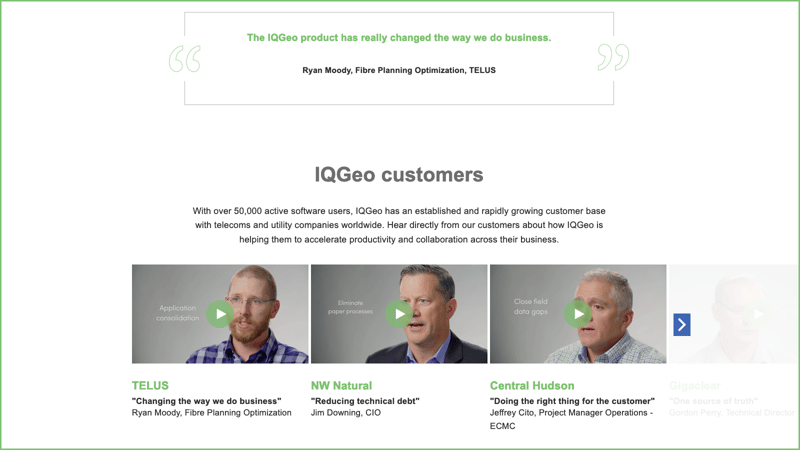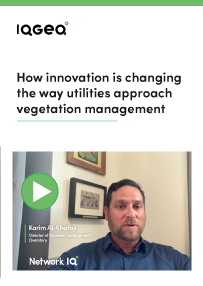Written panel series #2
In this series we will be asking our panel of experts across the geospatial, telecom and utility industries questions about the key issues impacting our world today. This month, we have asked participants about the importance of geospatial data for net zero carbon emission priorities.
“One of the biggest priorities for network operators in the utility and telecom industries in coming years will be meeting local, national, and international net zero carbon emission goals. Globally, governments and industry bodies are setting carbon targets and outlining initiatives for businesses. In response, organizations are starting to evaluate and change the way they operate and the services they provide to ensure they can achieve these goals. With this in mind, how must their relationship with data and particularly geospatial data change in order for operators to achieve ambitious net zero objectives?”
 “The future of the fight against climate change will be defined not by competition, but by how well different parties collaborate, share, and ultimately thrive.
“The future of the fight against climate change will be defined not by competition, but by how well different parties collaborate, share, and ultimately thrive.
Addressing long-term societal challenges requires a coordinated approach at local, national and international levels. As no one organization has the expertise or skills or data to solve significant problems alone, we need to become better at collaborating. To do so, we need to shift our mindset from an economic model based on siloed intellectual property and competition to a more collaborative economy based on information sharing and co-creation. Central to enabling the innovation capacity required to solve the challenges in society is the idea that data is not only a commodity but also a shared resource.
In the UK, for example, the Geospatial Commission is working with utilities, telecoms, local authorities and other infrastructure owners to develop the National Underground Asset Register, a new digital platform for sharing and accessing data about the subsurface. Key to its success has been working jointly with infrastructure owners to identify the legal, commercial, security, and safety requirements, which if not addressed will act as a barrier to effective data sharing. We elaborate on this in our report: Meeting Net Zero with the Power of Place..”
Read more from Luca Budello on the first installment of Network IQ - Innovation priorities for telecom and utility network operators.
 “From a utility perspective, net zero & zero carbon goals have a significant impact on the design and operation of the network and its assets.
“From a utility perspective, net zero & zero carbon goals have a significant impact on the design and operation of the network and its assets.
Decarbonization is a broad topic in itself, however if we consider it to cover the decentralization of generation, Distributed Energy Resources (DER), renewable energy sources, and the electrification of vehicles, then it will require a large-scale overhaul of the grid. The overhaul will need to include new connections, and, reinforcements of the existing network to support the new DER infrastructure, electric vehicles, new sensors, and much more.
To be successful in this transition, utilities will need an up-to-date and accurate digital representation of the assets in the field (digital twin) with integrated data flows between systems, accessible across the organization.”
Learn more about modernizing electric networks for the decarbonized grids of tomorrow.
 “All forms of non-financial reporting are non-standardized, however, there has been an increased interest in environmental, social, and governance (ESG) reporting in recent years where a plethora of standards exist. These standards and frameworks measure different things so enterprises need to consider their stakeholder priorities and what are the most important elements of the business to measure in relation to their ESG and net zero efforts. In addition to reporting on carbon emissions, this could include elements like the ethical treatment of employees and how these should influence the supply chain. From my experience of talking with companies in the utility and telecom space, many have chosen their priorities after consulting with regulators and other stakeholders and are now reporting against them. An important part of this is being transparent about their methodologies and the limitations of the data available.
“All forms of non-financial reporting are non-standardized, however, there has been an increased interest in environmental, social, and governance (ESG) reporting in recent years where a plethora of standards exist. These standards and frameworks measure different things so enterprises need to consider their stakeholder priorities and what are the most important elements of the business to measure in relation to their ESG and net zero efforts. In addition to reporting on carbon emissions, this could include elements like the ethical treatment of employees and how these should influence the supply chain. From my experience of talking with companies in the utility and telecom space, many have chosen their priorities after consulting with regulators and other stakeholders and are now reporting against them. An important part of this is being transparent about their methodologies and the limitations of the data available.
With the value of intangible and data assets now accounting for over 80% of S&P 500 market value, it’s perhaps more important than ever before to have plans and strategies in place to support the broad collection and preservation of the most valuable data within the business.”
Read more from Miranda Sharp on the first installment of Network IQ - Innovation priorities' for telecom and utility network operators.
 “At the Fiber Broadband Association, we are putting a hard focus on sustainability and developing Net Zero Carbon Footprint targets and best practices for the fiber industry. The use of fiber optics for broadband infrastructure provides significant sustainability benefits by eliminating active (powered) components with the deployment of PON (Passive Optical Networks). In addition to network design, best practices include leveraging geospatial data to optimize deployment and minimize truck rolls. In addition, geospatial data also helps minimize maintenance of plant and optimize subscriber turn up.
“At the Fiber Broadband Association, we are putting a hard focus on sustainability and developing Net Zero Carbon Footprint targets and best practices for the fiber industry. The use of fiber optics for broadband infrastructure provides significant sustainability benefits by eliminating active (powered) components with the deployment of PON (Passive Optical Networks). In addition to network design, best practices include leveraging geospatial data to optimize deployment and minimize truck rolls. In addition, geospatial data also helps minimize maintenance of plant and optimize subscriber turn up.
Fiber and these best practices are not only important for being good stewards of our environment but also significantly reduces operational expenses through lower energy consumption when compared to alternatives and legacy technologies.”
Watch Network IQ industry chat with Gary Bolton on strategies network operators can deploy to help them win the fiber broadband race.
 “To achieve net zero utility and telecom operators will need to make changes in many areas of their businesses over the coming years. Increasingly network operations will be automated, especially to reduce truck rolls with their obvious environmental impacts. Good quality data is critical to automation, and since utility and telecom networks are geographically distributed, a good understanding of where those networks are and how they are connected will be essential for success. For example, when there is an outage, being able to send the technician directly to the right location rather than the technician trying to narrow down the source of a failure by visiting multiple locations will result in a significant reduction in drive time, so benefitting both the environment and reducing network downtime. This is only possible with a fully connected geospatial digital twin of the network that is up to date and well maintained.
“To achieve net zero utility and telecom operators will need to make changes in many areas of their businesses over the coming years. Increasingly network operations will be automated, especially to reduce truck rolls with their obvious environmental impacts. Good quality data is critical to automation, and since utility and telecom networks are geographically distributed, a good understanding of where those networks are and how they are connected will be essential for success. For example, when there is an outage, being able to send the technician directly to the right location rather than the technician trying to narrow down the source of a failure by visiting multiple locations will result in a significant reduction in drive time, so benefitting both the environment and reducing network downtime. This is only possible with a fully connected geospatial digital twin of the network that is up to date and well maintained.
The network itself also produces emissions through the power required by the equipment. Research by the Prysmian Group clearly shows that FTTH\B networks generate the lowest CO2 emissions so to meet net zero targets fiber is the network of choice. Designing these new fiber networks exclusively relies on geospatial data.
The long terms benefits of FTTH networks are clear from this perspective but even greater benefit can be realized by the positive impact the network can have on the wider economy through digitization of both our working practices, with less need to travel, and digitization of buildings, through the use of smart technologies to improve quality of life, reduce social inequality, and cut emissions. Once again geospatial data, and the quality of that data, underpins many of these digitization initiatives so organizations must ensure that they manage their geospatial data as it is a vital component in the battle to reduce emissions.”
Learn more about the importance of consolidated data and digitization on - Managing your network through a single pane of glass - going beyond GIS.
IQGeo’s Network IQ series shares insights from experts on important telecom and utility industry conversations. You can enjoy the series through short written options and video interviews.
While legacy network management solutions still focuses on their GIS, IQGeo is different. Our Network Manager and application software focuses on your network, and how you can more flexibly and efficiently plan, design, construct and operate your increasingly complex networks. Whether you're building a new fiber and 5G network, modernizing your electricity grid for a renewable future, or delivering safe dependable gas services, IQGeo accelerates time to revenue from a single platform. Find out why our customers choose IQGeo.
Together with IQGeo, telecom and utility network operators build better networks to transform their business. The IQGeo software is setting new standards for productivity and collaboration that increase revenue, decrease operating costs, improve customer satisfaction, and enhance safety.

Visit the customer stories page to see how IQGeo is helping them to reimagine the role of geospatial software.

Network IQ industry chat with Karim Al-Khafaji from Overstory.
Watch interviewThe industry's most flexible and comprehensive geospatial solution to accelerate network planning, design and time to revenue from a single platform.
See it in action!Copyright © 2025 , IQGeo Group. IQGeo is a registered ® trademark